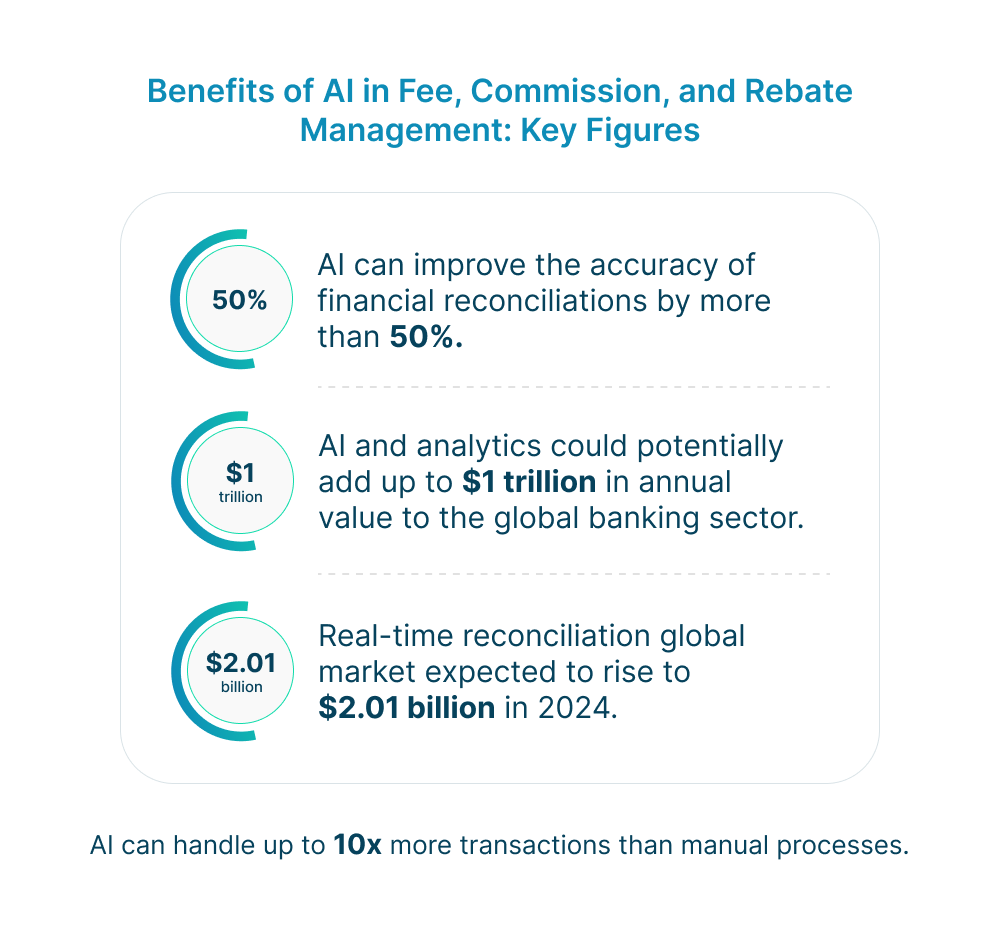Fees & Commission
The Future of Fee, Commission, and Rebate Management with AI in Payment Reconciliation
Explore how AI is transforming the future of fee, commission, and rebate management in payment reconciliation, enhancing accuracy and efficiency.

Amrit Mohanty
Sep 10, 2024 (Last Updated: Nov 6, 2025)

In one of our previous blogs ‘Leveraging AI in Reconciliation for Banks to Optimize Cash Flow,’ we uncovered the substantial influence that AI has exerted on the process of bank reconciliation. Similarly, the world of payment reconciliation is undergoing a metamorphosis, fueled by the power of Artificial Intelligence (AI). It is a future where businesses don't have to keep track of complex pricing structures, commission schedules, and rebate schemes. Instead, they have a streamlined, automated system that not only manages but also optimizes these tasks, revealing previously hidden information. Let's explore how AI is shaping the future of fee, commission, and rebate management in payment reconciliation.
A World of Complexity
According to a Forrester research, payment reconciliation is seen as the most labor-intensive business procedure by roughly 65% of businesses. It becomes a more challenging task to handle commissions, fees, and refunds in payment reconciliation. Numerous related expenses are involved in every transaction, including bank fees, commissions paid to middlemen, and rebates given to clients or partners. These elements are frequently dynamic, varying depending on the volume, currency, and even the time of day of each transaction. Conventional systems find it difficult to keep up, which causes inconsistencies, payments to be delayed, and tension to arise between companies and their stakeholders.
But what if there was a way to turn this complexity into an advantage?
Artificial intelligence: The Game Changer
Statista predicts that the global AI market will experience tremendous growth over the next seven years, increasing from USD 200 billion in 2023 to USD 2 trillion by 2030. So, AI is more than just a buzzword; it is a technology that is fundamentally transforming the way businesses operate. Artificial intelligence has the potential to revolutionize the way fees, commissions, and refunds are handled. By combining machine learning (ML), pattern recognition, and predictive analytics, artificial intelligence (AI) has the potential to transform the time-consuming process of payment reconciliation into one that is more efficient, accurate, and productive. Consider AI as a system that learns from each transaction, adjusts to new patterns, and forecasts future trends. In addition to tracking fees and commissions, this system anticipates changes, alters rates in real-time, and ensures that refund computations remain accurate even when circumstances change.
The Automated Future
In this AI-driven future, manual reconciliation processes will be a thing of the past. Instead, AI will automate the entire process, from the initial transaction to the final settlement. Here’s how it might look:
The Benefits of AI in Fee, Commission, and Rebate Management

The benefits of integrating AI into payment reconciliation are profound:
- Increased Accuracy: By automating the reconciliation process, AI eliminates human errors that can lead to costly discrepancies. A report by PwC UK indicates that AI can improve the accuracy of financial reconciliations by more than 50%, significantly reducing the risk of errors and fraud.
- Cost Savings: McKinsey projects that AI and analytics could potentially add up to $1 trillion in annual value to the global banking sector. AI can identify inefficiencies and optimize fee and commission structures, reducing costs.
- Real-time Reconciliation and Decision Making: Real-time reconciliation technology is rapidly gaining traction across industries. The global reconciliation software market, valued at $1.75 billion in 2023, is projected to rise to $2.01 billion by 2024. With AI’s predictive capabilities, businesses can make informed decisions based on data-driven insights, rather than relying on intuition or outdated information.
- Scalability: As businesses grow, AI can easily scale to manage increased transaction volumes without a loss of efficiency or accuracy. AI can handle up to 10x more transactions than manual processes, making it highly scalable for growing businesses.
Challenges and Considerations
While the future looks promising, the integration of AI into fee, commission, and rebate management is not without challenges. Businesses must consider the following:
- Data Security: As AI systems handle sensitive financial data, ensuring robust security measures is paramount to prevent breaches and protect customer information.
- Implementation Costs: The initial investment in AI technology can be significant, and businesses must weigh these costs against the long-term benefits.
- Adapting to Change: Transitioning to an AI-driven system requires a shift in mindset and operations. Businesses must be prepared to train staff, update processes, and embrace new ways of working.
The Road Ahead
The transformational power of AI holds great promise for the management of fees, commissions, and rebates in payment reconciliation. Enterprises that persist in adopting this technology will be able to achieve unprecedented levels of productivity, precision, and financial gain. In order to focus on what really matters—serving clients and fostering growth—businesses will be able to handle the increasingly complex world of payment reconciliation.
Managing fees, commissions, and rebates—a once laborious task—will become a strategic advantage in an AI-driven future, helping firms advance in a market that is becoming considerably more competitive. AI has the key to realizing the possibilities of the future—which goes beyond simply adapting to change and includes leading it in the true sense.

